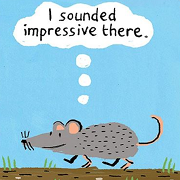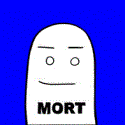|
Kyte posted:Couldn't you just ask the DM to treat the pommel or butt of the weapon as a sap and proceed from there? Absolutely the second one. It's possible to ask the DM to fix anything with the game, including things that don't need to be fixed. When discussing TTRPG rules, it's important to note that "the DM can make whatever rules they want" is not a feature, it is a baseline assumption and so needn't be taken into account when criticizing games. Put more snarkily, it's the game designers' job to design the game, not one of the players. The problem with the rules not having accommodation for something comes up when what the rules are supposed to represent conflicts with what the rules say. According to the rules, you can't use a sword or the like to walk up behind someone who doesn't know you're there and knock them on the head with the intent of disabling without killing. This may be accurate to real life, but not in the sort of fantasy adventure stories D&D is attempting to emulate. And, the thing is, the rules have allowances for using a lethal weapon nonlethally...but they explicitly can't be used during a sneak attack, meaning a rogue with a sword attempting to disable an opponent nonlethally is more capable of doing so by making their target aware of their presence, which makes absolutely zero sense. So why not allow that, in the manner you described? Well, the rules don't let you, and the rules were put there for a good reason. You bought the book of rules because someone made the rules, so why would you go and change the rules for no reason? Clearly there's something the designer knows that you don't, that's why you're buying their game and not the other way around. Now, we all know the actual answer there is "because D&D 3.5e has capital I issues with making physically doable martial actions have convoluted rules with multiple chances of penalty or failure while allowing actually impossible magical feats to do whatever they want" but a new player unaware of all this? It's bad design to force them to be a game designer because the actual game designer failed at it. Rosalie_A fucked around with this message at 23:59 on Jan 11, 2022 |
|
|
|

|
| # ? May 25, 2024 13:42 |
|
Kyte posted:Couldn't you just ask the DM to treat the pommel or butt of the weapon as a sap and proceed from there? Collaborating with your DM to change the rules to better fit a group's playstyle isnt possible in D&D but it is in this indie RPG nobody has ever heard of or wants to learn the rules for E: ^ lmao the exact post I was making fun of ^ Who What Now fucked around with this message at 01:34 on Jan 12, 2022 |
|
|
|
The proper answer to problems with DnD is to not play DnD.
|
|
|
|
Kyte posted:Couldn't you just ask the DM to treat the pommel or butt of the weapon as a sap and proceed from there? of course you can, it's a hard blunt object being applied to knock someone out, movie-style. the reasoning above ('if the rules are not 100% perfectly complete and consistent at all times without a single bit of DM intervention why did you even buy them?') is mainly to facilitate online arguments, at which it is solidly effective.
|
|
|
|
Wittgen posted:The proper answer to problems with DnD is to not play DnD. Will still nod along. And like both I got the illness that makes me seek then out World Famous W fucked around with this message at 01:46 on Jan 12, 2022 |
|
|
|
heads up I've changed the forum rules to make it OK to criticise Dungeons & Dragons. heh, some of us don't need moderators to tell us what we can and can't do
|
|
|
|
Isn't the solution to bribe the DM?
|
|
|
|
so I don't think most people (nerds excepted) relate to rules in a primitive tribal sense, where things are either mandatory or forbidden and god help you if you violate the rules. rules - particularly social rules, rules about directly interacting with other people - aren't about providing a yes/no list of actions you can or can't do, but about providing a common framework and value system that allows groups of people to communicate, to plan and predict behaviour, to structure thoughts and feelings in that sense pointing to Rule 0 and saying that radical freedom lets you decide for yourself what is mandatory and what is forbidden doesn't matter. people know what house rules are. the dispute is about what we want the rules to mean, how we want them to shape our community like I don't think Rosalie_A's problem is that the not-entirely complete and consistent rules actually interfere with their D&D game, as though every session Rosalie_A's Rogue just keeps on getting into situations where they need to non-lethally Sneak Attack someone and the rules just won't let them do it, goddamn the whole session getting derailed because there's no rules-as-written to let you knock someone out from behind, a bunch of p-zombies just sitting in a circle because they ran out of rules. the same goes for any other number of rules complaints, where the issue isn't some buggy rule keeps coming up and breaking the system, but rather a rule (and by extension, the system and product as a whole) doesn't reflect what people want to do and more importantly what they want their rules/system/product to mean hence why these complaints typically pivot to Wizard Supremacy or bookkeeping tedium or narrative tone etc
|
|
|
|
Lt. Danger posted:so I don't think most people (nerds excepted) relate to rules in a primitive tribal sense, where things are either mandatory or forbidden and god help you if you violate the rules. rules - particularly social rules, rules about directly interacting with other people - aren't about providing a yes/no list of actions you can or can't do, but about providing a common framework and value system that allows groups of people to communicate, to plan and predict behaviour, to structure thoughts and feelings I think a reasonable approach is to look at what the slant of the game is and accept there's more wiggle room in the relevant areas. 'because it would be awesome' is the slant of some games and so applying wiggle room in order to foster that is completely appropriate, e.g. using your 3 points of 'bartender at the roughest pub in the Bloodsail Docks' to shield surf down the lava flow in 13th age. 'because it would make some kind of sense in a physical universe' is sort of the apparent intended slant of 3.5, so applying wiggle room to e.g. allow one smallish hard object to substitute for another is fine.
|
|
|
|
In 2eís DMG the DMís advice section basically laid out example after example of when the DM would have to make poo poo up on the fly. The assumption that the DM will have to adapt RAW to various situations in the game has been built into the game from at least 1st Ed AD&D which is the earliest DMG I can accurately recall reading. One example that sticks with me was PC is full plate doing a somersault in combat to move from cover to cover. The bottom line was that the advice was just apply a penalty to the basic stat roll to account for the armorís cumbersomeness and a very rough outline of ďthe rule of coolĒ. IIRC example had the player fail and end up prone in the open. And that fail forward was not a concept to the designers in 1990 or whenever the game came out. Itís been 30 year so I may have it wrong, and it was tucked in between rules on dungeon design random room generation charts and followers accrued per level. But this is also the edition of the game that said you needed to have weapon proficiency in clubs in order to not take a penalty to your attack roll when swinging a chair in a bar brawl. And also really stressed that spell components and concentration were a big part of the Magic system and intended to help level the playing field between classes. Because lightning bolt needs the wizard to rub a bit of fur against a glass rod in order generate the static electricity to spark the bolt itself.
|
|
|
|
The little puns in spell components were p funny
|
|
|
|
One of the sources of the magic vs. nonmagic gap was probably that the magic users' weaknesses were annoying to track and relied on the DM to manage thme, while the fighter's weaknesses were straightforward penalties. "No you can't cast fireball unless you actually find a source to learn fireball and a bunch of bat guano" can lead to fun times and a quest to find a cave of bat poop in the same way that a paladin might go on a quest for a magic sword, and until the quest is over the wizard is stuck firing acid arrows or utility spells or whatever. But 90% of the time the group already has a more interesting adventure they want to do, and the wizard doesn't actually want to do his quest, he just wants to cast fireball. So the game gets streamlined, first unofficially 'yeah sure you just buy bat guano in a shop and find a scroll at the library' and then officially with the rulebook saying 'components under 25 GP are free and you pick two free spells to learn per level' so you can go back to your dungeon ASAP. But giving the fighter -4 and an implied 'gently caress you' if he wants to do pretty much anything that isn't "I attack for 1d8+5 damage" doesn't take any extra time, so it sticks around. I think the lesson "never use roleplaying penalties to make up for mechanical bonuses or vice-versa" was something that tabletop RPGs learned only after the 90s. NihilCredo fucked around with this message at 12:27 on Jan 12, 2022 |
|
|
|
I think you've hit the nail on the head. Magic and Martial were intended to be balanced from a "whole and balanced complete game" point of view, but time streamlined things so only the actual battlescapes Truly Mattered. However, I do also think early editions of D&D leaned very heavily (Subconsciously? Consciously? That, I'm not sure of.) into a mindset that wanted to reward geeks and punish jocks.
|
|
|
|
Superconsciously
|
|
|
|
I don't know if it was entirely that, so much as earlier editions of DnD trying to be "realistic." In a world where half the classes can casually break reality by wiggling their fingers. Then you have the restrictions that are put on magic users (ultra frail, need a lot of rest and upkeep, barely function at lower levels) being ignored for being buzzkills. This can be via edition changes (compare cantrips in 5E to the old crossbow wizard stereotype), house rules, or even just player dynamics. Bob the Fighter can go all day, but Jim the Wizard's out of spells. Bob's gonna rather the group is at full efficiency, and that his friend can have fun playing the game instead of being a vulnerable spectator.
|
|
|
|
oobey posted:I think you've hit the nail on the head. Magic and Martial were intended to be balanced from a "whole and balanced complete game" point of view, but time streamlined things so only the actual battlescapes Truly Mattered. misread this as "punish jokes" and it was still applicable
|
|
|
|
sebmojo posted:The little puns in spell components were p funny Googling this, I stumbled across this Material Spell Components in D&D 5e Google Sheet which points out quite a few of the puns in spell components that have lasted to Fifth Edition, originally posted on this reddit thread. Edit: Had a chuckle at Feeblemind's components of "Spheres of glass, crystal, or mineral", described as "Makes your target... lose their marbles." maltesh fucked around with this message at 17:17 on Jan 12, 2022 |
|
|
|
maltesh posted:Googling this, I stumbled across this Material Spell Components in D&D 5e Google Sheet which points out quite a few of the puns in spell components that have lasted to Fifth Edition, originally posted on this reddit thread. I remember Aganazzar's Scorcher as the workhorse "I need a level 2 damage spell". Turns out it require a freaking red dragon's scale, yikes. Also Tasha's Hideous Laughter requires "tarts", presumably as a pie-in-the-face joke. But now I'm thinking of a confused wizard hitting the local disreputable tavern for some ladies of negotiable affection to bring to the dungeon.
|
|
|
|
NihilCredo posted:I remember Aganazzar's Scorcher as the workhorse "I need a level 2 damage spell". Turns out it require a freaking red dragon's scale, yikes. Man, if I were a red dragon, and I'll learn that people are using my scales as spell component to a mere level 2 spell, I'll go haunt them outta spite.
|
|
|
|
Early adventure, go into an abandoned lair and scour it for shedded scales. Some kobolds, surviving worshippers of the dragon, remain. They could either be convinced to give up the scales for - depending on the party's murderhobo-ness - safe travel out of the area, stay-of-execution, or some sort of ongoing agreement for the betterment of all involved. While any condition of shed scale from the dragon will do the job, prideful wizards will pay more for better looking scales.
|
|
|
|
Accidentally posted this in the Gunnerkrigg Court Thread. " I think another component to physical combat versus magic is that we can actually visualize physical combat because we have always done it. Dual wielding swords is going to net you a penalty because that's hard to do in real life and not many cultures did it besides dualists/specialized roles. Pirouettes are a bad idea because your back is exposed. Honestly physical combat got nerfed in DND from real life because true combat results in someone very dead very quickly, with a debilitating combat. Fighting in real life is also traumatic and unpleasant. Roll willpower to keep fighting because you now have a gaping sidewound. Your enemies suffer a -2 penalty because one of their friends is dying on the ground calling for their mum. DM gonna have to do a long discussion on consent and boundaries after enacting that scene out at the table. Meanwhile magic is being made up on the fly. The earlier glass rod and fur was an attempt to have it make some sense, but streamlining stripped that away for a more enjoyable experience. There are no limits with this. Wanna fireball a room? Cool, lemme step out of the way. Wanna ascend to a lich? Well follow these easy, gamified steps! Wanna lift a mountain and drop it on a dragon with mage hands? Well rule of cool but gotta roll a big disadvantage."
|
|
|
|
|
Donkringel posted:Accidentally posted this in the Gunnerkrigg Court Thread. Lmao, it's not entirely off topic for the Gunnerkrigg Court thread.
|
|
|
|
Could a simulationist ethos be a bad fit for epic fantasy? 
|
|
|
|
Man, all these D&D debates and discussions just kinda seem to ignore that it's an 80s engine for a very specific adventure theme and sometimes that means you're gonna deal with jank when you take it off its very specific intended use-case. It's like trying to run a high-fantasy medieval setting adventure using Paranoia. Actually that sounds kinda cool, not gonna lie.
|
|
|
|
Dias posted:It's like trying to run a high-fantasy medieval setting adventure using Paranoia. 
|
|
|
|
Dias posted:Man, all these D&D debates and discussions just kinda seem to ignore that it's an 80s engine for a very specific adventure theme and sometimes that means you're gonna deal with jank when you take it off its very specific intended use-case. I mean. It's The big tabletop game, and 5E carries on a lot of the same baggage even if it isn't quite as mired down in it as 3.5 was. It's a little disingenuous to act like its a single very specific product, especially when its often treated as the end-all, be-all of tabletop gaming.
|
|
|
|
Dias posted:Man, all these D&D debates and discussions just kinda seem to ignore that it's an 80s engine for a very specific adventure theme and sometimes that means you're gonna deal with jank when you take it off its very specific intended use-case. Most editions of D&D fail to be the game the writers say it is.
|
|
|
|
This was so much loving fun.
|
|
|
|
Aw yeah, Wizard round on SS13.
|
|
|
|
It's really only 3.5e where martial classes are significantly terrible compared to full casters. 2nd edition fighters got strongholds and followers as part of their class progression, and fragile casters are much weaker in an era where they had more limited spell slots, fewer spells to choose from, no metamagic, and died instantly when hitting 0 HP. Even in 3.5e, I think it's mostly bad mechanical design rather than conscious intent that makes druids and clerics, especially, so strong (wizards are fine but they don't really win the caster wars, despite the memes). Fighters are written to be simple but powerful; they have a lot of HP, do a lot of damage, and don't run out of steam until they run out of HP. This would work fine if the underlying maths were good enough. Summoning is the big culprit - it breaks the action economy, and is written to integrate with the extremely poorly balanced Challenge Rating system, so you can use your caster progression to summon a bunch of fighter-equivalent monsters, and then do your caster stuff in addition to their attacks. 5e still suffers from a bit of this, but it's not nearly so pronounced - spellcasters are significantly weaker and non-magical characters significantly stronger, and all in all, it's fairly balanced.
|
|
|
|
The really key thing is that internal playtesting isn't really comprable to tens of thousands of people digging into the rules for twenty years to find optimization tricks. Especially when the playtesters are the people who designed the system and are thus fairly locked-in to the assumptions they made (if you focus sorcerers/wizards on direct damage, they look a lot less unbalanced) and the mass market isn't.
|
|
|
|
|
The Bee posted:I mean. It's The big tabletop game, and 5E carries on a lot of the same baggage even if it isn't quite as mired down in it as 3.5 was. It's a little disingenuous to act like its a single very specific product, especially when its often treated as the end-all, be-all of tabletop gaming. Oh, for sure, I think people defending D&D also tend to get way too stuck in their ways when it would do them good to explore other systems and settings when they start stumbling upon D&Ds limitations. Still, you can't say the game isn't very clear on what it's about, even if what it's about is sold as the be all end all of role-playing. It's just weird when people complain you have to rule zero situations it was never meant to cover.
|
|
|
|
Just play 7th Sea instead
|
|
|
|
|
How many people actually play high level characters as a percentage of folks who play in general? I can't think of any characters in campaigns I've run or played that that started at level one that have reached level ten. As a player and DM the 3rd-7th level seems much more like the most frequently played levels for folks in regular groups. And it's the higher levels where the spellcasters really take over in d&d.
|
|
|
habeasdorkus posted:How many people actually play high level characters as a percentage of folks who play in general? I can't think of any characters in campaigns I've run or played that that started at level one that have reached level ten. As a player and DM the 3rd-7th level seems much more like the most frequently played levels for folks in regular groups. And it's the higher levels where the spellcasters really take over in d&d. My group's campaign is coming up on it's 4th anniversary in May. We're level 11.
|
|
|
|
|
Low-level casters were weak in early D&D. D4 hit dice, useless weapons, no armor, could only cast one spell in an adventure, you only knew 4 spells to start with (and those spells were randomly determined!), punishing rest requirements (including wandering monsters), new spells were acquired randomly, etc. Plus there were a bunch of rules that restricted spellcasters even further (like the big, heavy, fragile, irreplaceable spell books, and having to collect and track spell components) if the DM was feeling particularly by-the-bookish. Mid-level casters were a match for the melee characters (basically, once they started getting mass direct damage spells like Cloudkill and Fireball, or encounter-changing ones like Passwall and Wall of Stone), and high-level casters dominated play (but that was OK because 1) the spellcaster had earned it by suffering through all those early levels as a scrub, and 2) the vast majority of campaigns fell apart before the mage got his hands on Gate and Meteor Swarm). One of the design goals for 3.x was to buff up low-level casters so that playing them would be a less miserable experience, which they accomplished but in doing so managed to overshoot their target by quite a lot.
|
|
|
|
habeasdorkus posted:How many people actually play high level characters as a percentage of folks who play in general? I can't think of any characters in campaigns I've run or played that that started at level one that have reached level ten. As a player and DM the 3rd-7th level seems much more like the most frequently played levels for folks in regular groups. And it's the higher levels where the spellcasters really take over in d&d. I mostly played in 3.0 / 3.5, but even then it was pretty common to start at level 5. Those editions were a little more generous towards low-level characters than 2nd ed., especially low-level sorc/wiz, but even a level 1 barbarian could still get incapacitated after a couple of hits from an early monster, and few people enjoyed playing STALKER in a tabletop setting. I did a few high-level adventures where you'd start at level 15 or so. They tended to go pretty well from a balance standpoint, because they attracted experienced players or at least experienced splatbook readers, and it was known that you could break the game with the right splatbook if you wanted, so there was an explicit effort to keep everybody on a roughly similar level of power-playing.
|
|
|
|
FMguru posted:Low-level casters were weak in early D&D. D4 hit dice, useless weapons, no armor, could only cast one spell in an adventure, you only knew 4 spells to start with (and those spells were randomly determined!), punishing rest requirements (including wandering monsters), new spells were acquired randomly, etc. Plus there were a bunch of rules that restricted spellcasters even further (like the big, heavy, fragile, irreplaceable spell books, and having to collect and track spell components) if the DM was feeling particularly by-the-bookish. Mid-level casters were a match for the melee characters (basically, once they started getting mass direct damage spells like Cloudkill and Fireball, or encounter-changing ones like Passwall and Wall of Stone), and high-level casters dominated play (but that was OK because 1) the spellcaster had earned it by suffering through all those early levels as a scrub, and 2) the vast majority of campaigns fell apart before the mage got his hands on Gate and Meteor Swarm). A friend of mine also once pointed out that the AD&D and OD&D books recommend a party (or are balanced for the idea of a party) of like 10 to 15 players, because it's still tight to it's wargame roots of "here's a pile of people". Popping off your one sleep spell then going to find out where Jim hid the rest of the pizza was pretty much expected.
|
|
|
|
FMguru posted:Low-level casters were weak in early D&D. D4 hit dice, useless weapons, no armor, could only cast one spell in an adventure, you only knew 4 spells to start with (and those spells were randomly determined!), punishing rest requirements (including wandering monsters), new spells were acquired randomly, etc. This is my memory as a teenager playing the Revised AD&D 2nd. We didn't have campaigns that lasted very long then, even if we'd be able to put in 16 hours of play over the course of a weekend. Also, being teenagers, there was the trouble of wrangling everyone to actually do an adventure and not make jokes about smoking 50 feet of hemp rope. One of the design goals for 3.x was to buff up low-level casters so that playing them would be a less miserable experience, which they accomplished but in doing so managed to overshoot their target by quite a lot. [/quote] I didn't play 3.0 at all, but when I came back to 3.5e as an adult I found low level casters to be solid but limited damage dealers so long as you didn't hand out opportunities to refresh spell slots like candy. If you're exploring a ruin in the course of one in game day your casters will learn pretty quick not to waste their higher level spell slots on smaller encounters. NihilCredo posted:I mostly played in 3.0 / 3.5, but even then it was pretty common to start at level 5. Those editions were a little more generous towards low-level characters than 2nd ed., especially low-level sorc/wiz, but even a level 1 barbarian could still get incapacitated after a couple of hits from an early monster, and few people enjoyed playing STALKER in a tabletop setting. Yeah, a very unlucky damage roll by an orc with a greataxe and your level 1 barbarian with 16 HP is incapacitated. If the orc crits, that barb is instagibbed. I've definitely started a lot of campaigns at level 3 to avoid that risk (though that lucky Orc might still get a one hit KO with a crit). I've grown to enjoy the chance that characters are in mortal peril, and 5E has certainly reduced that. They've also turned a lot of enemies into piles of HP... which I understand the reasoning behind but don't especially enjoy myself. Let me turn enemies into chunky salsa with one swing of a Goliath's maul! Or at least drop a thug in one round with sneak attack crits. quote:I did a few high-level adventures where you'd start at level 15 or so. They tended to go pretty well from a balance standpoint, because they attracted experienced players or at least experienced splatbook readers, and it was known that you could break the game with the right splatbook if you wanted, so there was an explicit effort to keep everybody on a roughly similar level of power-playing. I should run a higher level campaign someday, have everyone start at lv 12 or something.
|
|
|
|

|
| # ? May 25, 2024 13:42 |
habeasdorkus posted:I didn't play 3.0 at all, but when I came back to 3.5e as an adult I found low level casters to be solid but limited damage dealers so long as you didn't hand out opportunities to refresh spell slots like candy. If you're exploring a ruin in the course of one in game day your casters will learn pretty quick not to waste their higher level spell slots on smaller encounters. Casters as damage dealers was never the broken part. Dealing out a few d8s with Magic Missile or a few d6s with Fireball was impressive but limited enough to be mostly fair. It was the ability to cast Sleep or Color Spray or Hold Person and end the encounter, or summon a monster that fought as good as the fighter or... that was the issue.
|
|
|
|














































